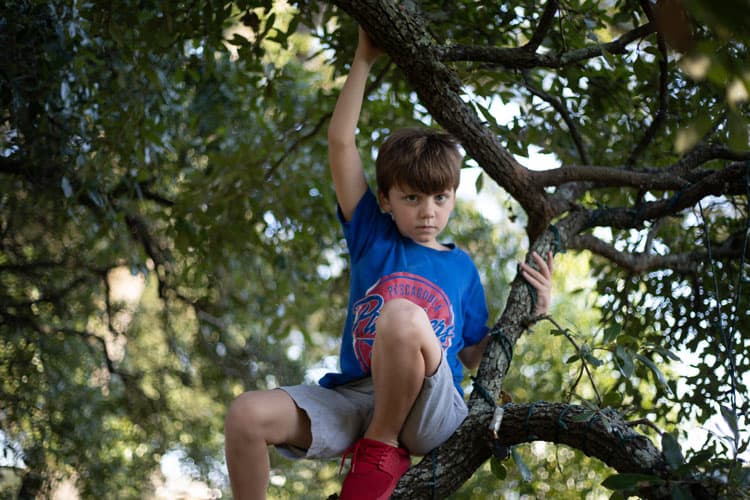Free-range parenting has been around for ages but lately, the term has become more popular among parents. So what exactly is free-range parenting? Simply put, it’s the decision to let your child be more independent and make decisions for themselves. This may apply in the home, at school, or out in public. Before you choose to adopt the free-range parenting style, here are the things you need to know.
What is free-range parenting?

Free-range parenting might sound like a farm term and while it is not about farm animals, it is similar. Free-range animals can walk about freely without oversight just like free-range kids can do the same without oversight. The difference is that children can be talked to, reasoned with, and taught how to navigate the world safely when they’re on their own. Helicopter parenting (a micromanagement-parenting style) is the opposite of free-range parenting.
What free-range parenting used to be

If you were a 90’s child, you were most likely a free-range kid. Running to your friend’s house after school to play until dinner time. Riding your bike around the neighborhood alone. Walking several blocks to and from school on your own. These examples are what free-range parenting used to look like, during what some would say the “better days” when life felt safer. In hindsight, some of these common free-range parenting ways may not have been perfectly safe.
With that being said, there were some great life skills and experiences that came from being a free-range kid. Children spent tons of time outdoors, playing with neighbors, being creative, and developing their social skills.
What free-range parenting is today

Free-range parenting today has refined the free-range parenting ways of the past by keeping the good parts and making other parts safer for children, while still allowing them to be independent. With that being said, “free-range parenting” is defined by the parent and parents define things differently. For example, one parent may be completely okay with their 10-year-old riding on public transportation alone whereas another parent would never consider allowing their 10-year-old to do so.
Examples of what free-range parenting may look like include:
- Letting your child choose what they want to eat, wear, and who they want to spend time playing with
- Allowing your child to teach themselves how to learn a new skill
- Teaching your child to ride public transportation or walk someplace alone
- Preparing your child for the dangers of the world and how to properly respond (e.g. “No” means “no” and body boundaries)
- Teaching your child how to talk with strangers; what’s appropriate and what’s not
- Teaching your child how to respond if they become lost or afraid
- Teaching your child how to be safe digitally with phones, apps, websites, etc.
Related articles:
- 8 Effective Positive Parenting Solutions
- 9 Technology Lifesavers for Busy Moms
- How To Be A Good Parent
Pros and cons of free-range parenting
The Pros:

Teaches independence and builds confidence
Free-range parenting allows a child to think for themselves and make their own decisions without a parent thinking for them and making decisions for them. When a child practices decision-making over and over, they develop more independence and more confidence. They become more comfortable and can more quickly determine the next (and best) steps in a variety of situations.
Free-range kids also build stronger social skills with children and adults. Without a parent talking for them or facilitating the conversation, children must navigate these conversations alone which results in more confidence overall.
Builds creativity
There’s nothing wrong with a parent leading playtime with their children (children love it!), but there’s something to be said about a child who is playing all on their own. They are able to think for themselves and really build on their creative skills. A free-range kid all of a sudden has a ton of room and space to imagine and explore.
The Cons:

Risks and statistics
Depending on your community, the area at large, and your child’s demographics, free-range parenting may carry a higher risk. For example, “71% of non-family abductions happen on the way to or from school” and teenagers are the highest-abducted age group. So if you have a teenager that walks to and from school, statistically, they have a higher chance of being abducted. Statistics and risks should be considered.
Being in the digital age, free-range parenting may include the unsupervised use of cell phones, apps, websites, etc. If so, risks and statistics should also be considered in this area.
State restrictions
Every state takes some sort of stance on how “free” a child is allowed to be, like how old they must be before being left home alone. For example, Ohio does not require a child to be of a certain age before they can be left alone at home. Instead, they encourage parents to make a decision based on their child’s maturity level and abilities.
Depending on what state a parent lives in, there may be specific restrictions to free-range parenting that they’ll need to read up on before making any free-range decisions.
Is your child ready for free-range parenting?

Considering your child’s character and prior experience up to this point is a great way to judge whether they’re ready to be more independent and on their own in certain situations. Things to consider include:
- Are they trustworthy? Do they generally always tell the truth?
- Have they made good judgment calls in the past?
- Do they have a good amount of experience traveling alone, being away from you, etc.?
- Do they show a high level of maturity?
- Do they understand risks and consequences?
- Are they able to stay calm in an unexpected or unsettling situation?
If you’re not sure you know the answer to some of these questions, take the opportunity to “test” your child. Ask them what they would do in certain situations. Try testing the waters by allowing your child to do something independently for a short amount of time and then evaluate how they did. Increasing the timeframe will help you build trust in your child and help your child become more confident.
Summary:
Free-range parenting is defined however the parent wants to define it so we cannot assume that free-range parenting as a whole, holds a particular set of rules for everyone. Each parent should seriously consider what free-range parenting means to them, the pros and cons of free-range parenting and if their child is ready.
Are you a free-range parent? What does free-range parenting mean to you? We’d love to hear about your experience below!

Morgan French is a wife, mom of two, writer & editor. After traveling for 3 years with her family, she now lives back in her hometown of Dayton, OH. She makes frequent stops for coffee, enjoys the outdoors, and loves board games.



Leave A Comment